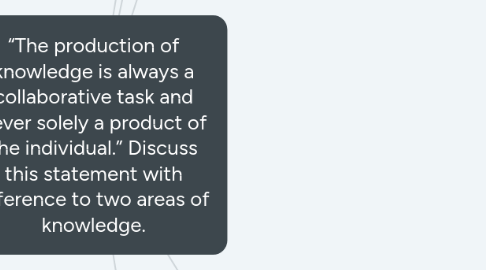
1. Rewrite
1.1. The formation of original new ideas only happens when multiple people work together towards it and can never be produced by a single person.
2. Keywords
2.1. Knowledge
2.1.1. Official Definition
2.1.1.1. facts, information, and skills acquired through experience or education; the theoretical or practical understanding of a subject.
2.1.2. My Interpretation
2.1.2.1. Information acquired which increases one's understanding of the world around them.
2.2. Collaboration
2.2.1. Official Definition
2.2.1.1. the action of working with someone to produce something.
2.2.2. My Interpretation
2.2.2.1. Multiple people (usually two) working together to create something new, to produce new knowledge in this case.
2.3. Individual
2.3.1. Official Definition
2.3.1.1. a single human being as distinct from a group.
2.3.2. My Interpretation
2.3.2.1. A single person. If an individual produces knowledge, there was no direct input or communication with any other human to produce that knowledge.
3. Key Phrases
3.1. Production of Knowledge
3.1.1. Formation of new original thoughts and ideas which help better understand the world.
3.2. Collaborative Task
3.2.1. When multiple people work towards the same goal and may produce new knowledge over the course of the task and upon finishing it.
4. Rewrite
4.1. The formation of original new ideas only happens when multiple people work together towards it and can never be produced by a single person.
5. Connections to Classes
5.1. Physics
5.1.1. Natural Sciences
5.1.2. Kepler's Laws of Planetary Motion
5.1.2.1. The name of the law only has Kepler's name in it, even though Tycho Brahe is said to have laid the foundations for Kepler's Laws
5.1.2.1.1. WOK
5.1.2.1.2. Language and Concepts/Historical Development
5.1.2.2. How can we value and rank the knowledge produced by different people involved in the same production of knowledge.
5.1.2.2.1. WOK
5.1.2.2.2. Methodology
5.2. Arts
5.2.1. Music
5.2.2. Mussorgsky: Pictures at an Exhibition
5.2.2.1. Maurice Ravel's Arrangement
5.2.2.1.1. Personal Knowledge: Maurice Ravel altered many elements of the piece. It has been said that Ravel's orchestration transformed Pictures at an Exhibition to something that can be played at concert halls.
5.2.2.1.2. To what extent can an interpretation of original knowledge be given credit if the interpretation produces new Knowledge.
5.3. Religious Knowledge Systems
5.3.1. Religious Knowledge Systems
5.3.2. Founding of Islam
5.3.2.1. According to Islamic Belief, the Prophet Muhammad is credited as being the sole messenger of Islamic belief from God to Earth
5.3.2.1.1. WOK
5.3.2.1.2. Historical Development
5.3.2.2. Connection
5.3.2.2.1. WOK
5.3.2.2.2. Framework Area
